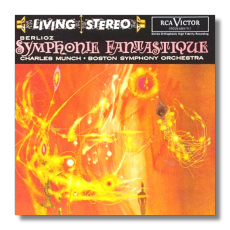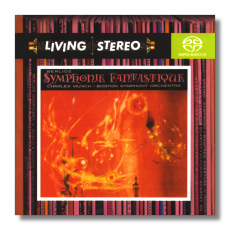
The Internet's Premier Classical Music Source
Related Links
- Berlioz Reviews
- Latest Reviews
- More Reviews
-
By Composer
-
Collections
DVD & Blu-ray
Books
Concert Reviews
Articles/Interviews
Software
Audio
Search Amazon
Recommended Links
Site News
 CD Review
CD Review
Hector Berlioz

- "Symphonie Fantastique" Op. 14 (1828)
- "Roméo & Juliet:" Love Scene, Op. 17 (1839)
Boston Symphony Orchestra/Charles Munch
RCA Victor Living Stereo 09026-68979-2 ADD 59:59 (1954 & 1961)
Also released on Hybrid Multichannel SACD
Amazon
- UK
- Germany
- Canada
- France
- Japan
- ArkivMusic
- CD Universe
There are a lot of things I want to talk about concerning this disc, much of it may seem a digression, so you are forewarned. I have tried to place stories about this issue which are not directly related to a review of this disc at the end of the review in post scripts. You may now skip to the first post script for a mystery story.
This has always been my favorite recording of this piece. I had it on LP, but not in the "Living Stereo" series. This recording/performance has fire in its belly. It is the fastest I know of by several minutes. It is tense, the bass line is nicely defined. You have to remember what a thunder bolt this must have been for its time. One of the things I love about this recording is that it reminds me that this piece was not unlike the "Eroica". (See post script #2.) For me, the most important moment in the piece is the bells in the last movement. They need to not only be perfectly balanced, they must reflect a Twilight Zone-like intonation. It needs to be something you fear. Several otherwise excellent recordings have run afoul on this reef. This Boston Symphony Orchestra recording is among the finest I know at this defining moment: Martinon, Monteux in San Francisco to mention but a couple. You really feel like Macbeth coming upon the witches. (Okay, that's the beginning of the play…no analogy is perfect!)
One of the interesting things about this recording is that a direct comparison is possible by obtaining (if you can find it) the CD issue of Munch's 1967 recording of the same piece with the Orchestre de Paris (released in Europe on EMI 737222, not generally available here. I found a copy in "Street Side Records" in their "Imported discs" bin. That company has since gone bankrupt.) Anyway, it was on LP, too. That performance is a good recording, though a bit cavernous. I sometimes feel it has a more sensual texture than the RCA recording. It also has less adrenaline, however, coming in almost three minutes slower than the Boston Symphony Orchestra recording. This is not just a matter of speed. Another of my favorite recordings is Martinon's, also on EMI, which has about the same tempi, but there is more tension and attacks are sharper. I would not be without the EMI Munch recording because it is interesting how such a different performance still has the Munch touch. There is a phrasing Munch brings to matters that is all his own. This can be heard in the woodwinds in particular and in the balance between orchestral forces.
As for the coupling, I happen to like it a lot. Is that an accordion or a bandoneon I hear in the background? (I have just recently been introduced to Ástor Piazzolla and this sound is much like a bandoneon, or maybe it's just me.) This is certainly love music and I would not be surprised if it was used in a movie of the play. I should mention one matter that may concern the listener. It has been pointed out on the classical forum I am part of, that the music has been tampered with. Specifically, the choral introduction to the music, which was on the LP, has been omitted. One person on the forum particularly bemoaned this because he felt it changes the whole perspective. I would not be able to comment on that since I never had that LP, but I can say that I find what is here just fine. You should know, however, that if you are expecting the choral introduction, it ain't there.
This incarnation of the Symphonie Fantastique, however, is a must buy, a desert island disc. RCA's 20-Bit remastering has wrought wonders. You can feel the bass in the floor. The inner details are delicious. The whole thing is a sonic wonder experience that tickles the back of my brain.
Post Script. Contrary to the company's claim, this is not the first single CD release of the Symphonie. There is an odd story about how this, and some other discs, was released on CD several years ago. In the summer of 1993 David Qualls, a member of the Leopold Stokowski Society of America, wrote and informed me he had picked up Stokowski's "Eroica" in a 'media' shop that carried videos and CDs. At first I didn't believe him, Jack Pfeiffer would surely have let me know about this release. But he sent me a copy, and it WAS the Stokowski release, including the 9026 prefix. Long and convoluted discussions with Jack began. The shop that had the discs in Arizona had a sister shop, Video Town, in Cowlumbus, Ohio, too. Through that store I got hold of the parent company and purchased several copies of the Stokowski and a single copy of the Munch Berlioz Symphonie Fantastique from 1954. Shortly after I got those copies the company was bought out by Blockbuster and suddenly nobody knew anything about these discs. Jack finally told me that these discs had been produced with RCA's acknowledgment. The company that produced them had some new process they wanted to convince RCA to adopt. RCA decided against the process, even though several hundred discs had been pressed. I hold in my hand 9026-61329, this version of the Symphonie Fantastique, as proof that I am not making this up. The copyright date on it is 1983, the year RCA issued several LPs in the "Legendary Performers" series. I asked Jack if there were plans to release this series and promote it. I was told that the people who had been in charge of this project "no longer work for RCA" and that the discs would never be released by RCA. Only the few scattered copies I got (or some other people shopping in an obscure video shop happened across) exist. Here's my guess. The company that produced the discs suddenly ended up with several hundred CDs they couldn't sell to RCA. What to do? [Well, we could sell them to this video/CD shop that carries a few classical titles. We'd get that monkey of our back and recoup some of the costs. RCA will never find out because who in the hell would ever look for these kinds of things that really knew what they are?]
Post Script #2. For some reason, Paul Kletzki's Czech Philharmonic recording is the one that particularly came to mind. I played it to confirm that this sensation was not just a trick of my memory. I don't explain them, I just report them.
Copyright © 1998, Robert Stumpf II





















